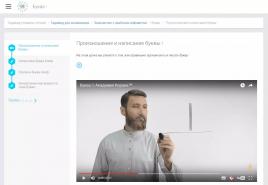Training tasks for ket for schools. What is KET? Key English Test
Greetings, my dear readers.
Sometimes to achieve our dreams we just need to take a step in the right direction. Many of my friends have dreamed all their lives of going somewhere to Australia, enjoying the sun and ocean. But this dream remains a dream.
But this is impossible! Dreams are for making them come true!
If you want to go to Australia, take the exam and move there to live for a couple of months! Take at least one small step towards your happiness.
This small step could be the international English exam KET.
Have you heard of this?
Today I will tell you what it is needed for, what parts it consists of, what traps you can fall into, and what manuals you should use to prepare yourself in order to avoid these same traps.
What is KET?
This is the first of a series of Cambridge exams that tests knowledge of general English. It is suitable for adults who have been studying the language for some time, and also for children who are at least 12 years old. This test confirms knowledge of level A2 - Pre-Intermediate .
The certificate of this exam does not have a limited validity period, that is, you can use it after a year or after 10 years!
What does KET give?
By passing this exam, you will have evidence that you can:
- Speak in English on simple topics;
- Understand simple texts by ear;
- Read simple advertisements and texts;
- Write small letters competently and beautifully.
What to do with all this knowledge?? - you ask.
Here's what:
- You can go and no longer feel stupid and strange in a foreign country, communicating only with the phrases “ How much? And " I'm fine».
- You can travel to another country for work. This certificate allows you to apply for simple jobs such as tourism, sales, hospitality, etc.
Exam structure
The exam consists of 3 parts: reading and writing, listening and speaking.
- Reading and writing.
9 tasks for which 70 minutes are given. The tasks here are very diverse:
— Fill in the text with one of three word options;
— Determine whether the information in a sentence based on the text is correct;
— Write a short letter in a few sentences;
- Based on the definition of the word you read, write what kind of word it is.
The worst thing candidates can face here is misunderstanding vocabulary. After all, as we are used to: if you don’t understand even one word, that’s it, the text is littered. But in reality, you can just guess this word (by the way, this is also an important skill and it’s called linguistic guess!) Of course, work on expanding your skills, but remember: you can’t learn all the words!
- Listening .

A very interesting part of the exam. In fact, more than half of my students love it. Especially children - for the colorfulness of the material presented and the interesting construction of tasks.
In total, this part takes 30 minutes of time to complete 5 tasks. Please note that this time period also includes time for filling out answers (which must be entered on a separate sheet!)
Here, what kind of tasks can you get here?:
- Choose from 3 pictures the one mentioned in the dialogue;
— Connect words from two lists based on what you hear;
— Answer questions about the dialogue;
— Listen to a note, dialogue or monologue and write down the information correctly;
As in the case of speaking, many students are afraid of not understanding what is said and, in the future, not understanding which answer is correct. Your salvation is practice, practice and again. Yes, and also replenishment of the lexical base, where would we be without it!
- Speaking.

Passing this part of the exam is not as easy as it seems at first glance, because everything will have to be done in pairs with another candidate. And for two you will have no more than 10 minutes to fully demonstrate your abilities.
First part- These are answers to questions about yourself. In total it takes about 5-6 minutes. And here in the second part one candidate receives a card with a topic, and the second one with a topic. Accordingly, the first will have to answer the questions of the second. Then they change roles.
So that this entire description is not unfounded and incomprehensible, I offer you an example of tasks for this test. The archive contains a complete example of the exam, by which you can determine your strengths, assess your weaknesses and begin to think through a preparation plan.
Good news for all schoolchildren: they can get a certificate of this level by passing the exam KET for Schools. The most important difference of this exam is in the subject matter of the materials, so that schoolchildren from 11 to 14 years old find it understandable and interesting.
How and for what to prepare?
You need to prepare using high-quality and proven textbooks. Here are my favorite preparation guides:
1. KET Practice Tests
Lots and lots of practice for your exam success.
2. Vocabulary for KET.
What I have talked about more than once today is your vocabulary. Here's a great way to improve your vocabulary quickly and effectively.
 3. ObjectiveKET.
3. ObjectiveKET.
Comprehensive preparation for all parts of the exam: repeating grammar and learning new ones, learning new words, gaining listening and speaking skills - everything is here.
4. Key for Schools Result
A book for comprehensively preparing a child to take a test that is quite difficult for him.
5. Key English Tests.
And finally, a few more tests to be sure ;).
Just remember, my dears, that you don’t need to rush into all the books at once. Develop a systematic approach. For example, choose one book that you will go through step by step. In addition to it, take a book on vocabulary. And with certain breaks, study the book with tests. Do everything in order and systematically, and then a good result will not be long in coming.
How to make the process of passing the exam much easier.
- Vocabulary.
Today I have spoken more than once about how important a good vocabulary base is. It all starts with her! The probability of not understanding the text, the probability of not understanding the dialogue you heard, the probability of not remembering a word during a conversation - all this hangs over you if you do not expand your vocabulary!
What can be done? Read and listen! Read literature adapted to your level, watch simple films or even cartoons, listen to English speech and practice! You will not notice how your vocabulary will be replenished, and you will become much more confident in your knowledge!
- Be wrong.
For many at this level, there is a greater fear than public speaking - talking to another person - and especially a foreigner - in English. But it definitely needs to be overcome. Do you know where it comes from? For fear of appearing stupid, saying the wrong word, or making a mistake. But how could we do without it? This is the only way you can improve your abilities! Make mistakes, analyze and remember! This is the path I advise you to follow!
How much does it cost to take the exam?
The cost of passing the exam is approximately 5,000 rubles. Of course, in five years the figure may change, but today it is approximately the same (2015-2016)
This, my dears, is what the famous exam looks like. I hope that this material will help you clearly understand exactly how this exam differs from all others. Although, I’ll tell you a secret, they are all very similar. Just shh...!!!
By the way, you can watch the video now and put yourself in the shoes of the students taking this test. Take a breath and breathe deeply))
And for today I say goodbye. Good luck!
In the modern world, knowledge of foreign languages is mandatory for educated people. But this is a way out not only to a cultural and enlightened society, but also to expanding people’s horizons, the disappearance of state borders for interethnic business and informal communication, and the exchange of experience and heritage of ancestors. This makes people, first of all, not indifferent to the life, traditions and problems of other nationalities.
Foreign languages are recognized as necessary in the school education of new generations of people. In modern schools, from the first day of school, children are taught the words, colloquial phrases and folklore of other languages. English has a leading position in this.
And, of course, after a certain period of time, children in schools are tested in various ways. It depends on the child’s age and level of English language learning.
What is KET? This is the same test of knowledge. A test that allows the teacher to see how well the material has been learned.
What kind of exam is this?
What is KET? in the form of a test. The abbreviation stands for Key English, a test of knowledge of the English language that is needed in everyday life, that is, a spoken language of everyday use and practical purposes:
- At work;
- visiting friends;
- on a walk;
- when going out;
- on learning.
Essentially speaking, this is an English language exam, which is conducted on the basis of four types:
- oral speech;
- fluent reading and writing;
- listening.
This test is called Cambridge because it was created and developed at this institute for students and people who speak other languages (that is, not English).

This happened in the nineties of the last century. But recently they remembered this exam and improved it a little, significantly changing the structure of the test itself and its content. Now KET is a type of knowledge test aimed mainly at schoolchildren.
But this testing is not limited to schools. Every year thousands of people confirm their level of English proficiency in this way. For what?
- This is necessary to understand what level exactly you have.
- Find out specific gaps in language knowledge and deepen your study in these areas.
- A KET certificate can be a great addition to your portfolio when looking for a rewarding job.
KET in schools
KET for schools is a version of the famous Cambridge test, designed to test the initial levels of knowledge of the English language in adolescents from 11 to 14 years old. Schoolchildren take an adapted version of the test, which allows them to understand in the future how to prepare for final exams, as well as reduce the psychological burden on the child’s psyche. It seems that such an exam has already been passed, for example, without any problems, so why be afraid of the next English language exam? The question of what KET is no longer exists. The schoolchild ceases to be afraid of him because he is familiar with him.

Test structure and content
The exam lasts on average 1 hour 50 minutes. During this time, the student goes through three stages of the test:
- reading and writing - reading and writing is the longest and most important part, in which you need to read a passage of text in English (unadapted text, most often from English literature) and answer questions about it in writing;
- listening is listening to dialogues and writing answers (in the form of a test) on them;
- conversational part - conducting a dialogue between four people on a given topic or specially selected material; two examiners and two examinees participate in it.
After summing up the test results, all answers receive passing scores according to the specified sample. Those who pass the Key English Test receive a certificate indicating this.
Important!
The exam is carried out only in institutes, schools and universities accredited by the University of Cambridge for this type of test. There are a little more than two thousand of them in our country.
The test is taken six times a year, mainly in the summer months.
After testing, a corresponding certificate with unlimited validity is issued.
Repeated confirmation of English language knowledge will not be required.
How to prepare for it?
Requires KET (Key English Test) preparation at a very serious and intensive pace.
It is necessary to have a good knowledge of the rules of the English language, syntax and spelling.
You need a vocabulary that covers diverse topics. Including colloquial words and phrases and slang.
A good help for preparation would be to familiarize yourself with the Objective KET and KET Practice Tests Plus editions.
You can also find all the answers to your questions regarding this test on the official Cambridge English website.

Example exam
1) The first part of the test is exercises on - answer." Consists of approximately 60 such exercises, including texts. Approximate types of questions:
- you need to insert the missing word in an English sentence;
- put the words in an affirmative or interrogative sentence in their places;
- answer the question (in short or long form).
Examples of tasks:
- Put the words in the questions in the correct order:
- who's going to? can the disco.
- how the race is long.
- does it how much cost.
- is what prize the first.
- are the runners old how.
- Fill in the missing word:
- My mother... book at the moment. (reads, read, reading)
- Do you want...a film tonight? (to see, seeing, to seeing)
- There are three... on the wall. (photos, photoes, photo)
- This is... film I have even seen. (best, the best, the most best)
- They ... to Russia last summer. (go, went, going)
2) The second part is listening to some prescribed text, and then answering questions about this text.
3) The third part is dialogue. Completely different topics can be covered here. For example:
- personal, including biography and family, favorite activities, hobbies and more;
- business topics, but not deep into a specific profession;
- everyday situations (at home, away, with friends);
- food, products, names of various dishes;
- natural landscapes, animals, birds and marine life;
- travel, excursions and trips;
- healthy lifestyle and sports.

Hint for the first part
Translation of sentences in which the words are already in the right order:
- Who can go to the disco?
- How long is this flight?
- How much does it cost?
- What's the first price?
- How old are the runners?
Translation of sentences with inserted words:
- My mother is reading a book at this moment.
- Do you want to watch a movie today?
- There are three photographs on the wall.
- This is the best film I've ever seen.
- They went to Russia last summer.

Necessary rules
To successfully pass the test, you need to understand the following topics in the English language:
- rules for constructing sentences (affirmative, interrogative and negative);
- noun and the use of the definite, indefinite and zero articles with it;
- adjective (use and degrees of comparison);
- pronouns (personal, possessive, demonstrative, interrogative, negative and indefinite, as well as reflexive and relative);
- cardinal and ordinal numbers;
- the use of verbs, including in tense agreement and passive voice);
- verbs in different tenses - present, past and future (simple forms, continuous, perfect (perfect), perfect-continuous);
- gerund and participle;
- modal verbs.
Lexicon
Words can be learned immediately from the topics of the third part of the test. However, the list of familiar words and vocabulary constructions must be at least 2,500 thousand, including prepositions, participles and numerals.
This figure may seem very large and unattainable. But if you have a below-average level of knowledge of the English language, if you read some adapted book of 100 pages, you will understand that you already know fifteen hundred words perfectly well.
How to increase your vocabulary more effectively and quickly?
- Daily training (reading, working with a dictionary, listening to audio materials (including radio stations), watching films and television programs in English).
- Study a few words or phrase structures every day. It is better to have several meanings for one word or construction.
- Learning poems, idioms, proverbs, song lyrics in English.
- Constant contact with the dictionary.
On one day you may not try to try all the workouts at once, but you definitely need to devote half an hour of your free time to them.

Other types of similar tests
We’ve already figured out what KET is. This is the very first and simplest exam for language proficiency at an upper-intermediate level. However, there are more complex tests:
- Preliminary English Test (PET) - corresponds to the average level of language knowledge. It is often mandatory for office workers and secretaries serving in leading positions in companies and organizations. But basically the test is not much different from the Key English Test.
- First Certificate in English (FCE) - tests knowledge of the English language at an upper-intermediate level. This is an understanding of the rapid English speech of native speakers, television programs and radio broadcasts, the ability to freely express one’s thoughts and opinions.
- Certificate in Advanced English (CAE) - advanced level. The topics in it become noticeably more complex; the ability to read and understand specialized business texts and spoken language is necessarily tested.
- Certificate of Proficiency in English (CPE) - professional level. The difficulty of the test is high. Native level knowledge of English is required.
The upper limit is the exam CPE, which is taken by those who speak English almost as well. Accordingly, the international exam KET, which this article is dedicated to, is the first step in improving your knowledge.
International exam KET intended for adults and children over 15 years of age. For younger children, namely from 11 to 14 years old, there is a group of exams, which we will talk about separately. Exam Key English Test, being, developed directly by the examination department of the university of the same name Cambridge ESOL (English for Speakers of Other Languages). An international exam has appeared KET in the early nineties (1991-1994). Five years later it was revised. A new exam structure and content was developed and came into force in March 2004. It should be noted that there is not only simple KET, but also KET for schools(for schoolchildren). There is no difference between the two versions of this exam. In the second case, the topics and content of the exam are more focused on the interests, hobbies, experience and age of the students.
Structure of the international exam KET
Every year there is an international exam KET About 40,000 people from 60 countries are trying to pass the test. To get into their number, you just need to register at the British Council training center, which accepts this exam, pay the cost of the exam, and at the appointed time pass all types of tests, and in this exam there are three of them:
- Reading and writing(reading and writing), to which 1 hour and 10 minutes of examination time is devoted. You are offered simple information from brochures, newspapers and magazines in English, on the basis of which you must complete several types of tasks - fill in the gaps in sentences, complete sentences, write a short text of up to 25 words.
- Listening(), which you are given half an hour to complete. After listening to announcements and monologues in the form of audio recordings, which will be spoken at a slow pace, you will have to answer a certain number of questions. This tests your ability to understand English by ear.
- Speaking(speaking), taking 8-10 minutes of your time. This test usually takes place in the presence of two examiners, one of whom communicates with you, and the other evaluates your abilities. In addition, in speaking you are paired with another candidate taking the international exam KET. This is necessary to complete a joint task. Accordingly, this stage KET involves a conversation containing questions and answers, as well as the ability to introduce yourself to a stranger.
Completed assignments are checked by accredited Cambridge specialists ESOL, which evaluate your knowledge based on the sum of points for all tests (1st stage - 50%, 2nd and 3rd - 25% each). In a couple of months you will be able to find out whether you passed this exam (70%-84%), whether you were successful in it (85%-100%), or whether you coped with the task, but not quite well, so you receive a level certificate A 1, which means that you can take part in a simple dialogue in English on a predictable topic, are able to write a simple questionnaire or note indicating the time, date and place, but this is not enough for an international exam KET. If your percentage of points obtained is 0%-44% correct information, you have failed the exam.
As self-preparation for the international exam KET I would recommend the following training courses:
- KET Practice Tests Plus
- Key English Test
- ObjectiveKET
Or use the materials offered by the official website of the Cambridge exams - cambridgeesol.org .
https://site/dialogues-with-translation
If you find an error, please highlight a piece of text and click Ctrl+Enter.
Cambridge exams are becoming increasingly popular in our country. They allow you to objectively assess the overall level of language proficiency, and their results are recognized throughout the world.
Among a fairly large number of different international exams in English, a separate category consists of tests for students with an initial level of language proficiency. Passing them is the first step that should be overcome by those who strive for perfect command of a foreign language. These exams include ket (key English test). The development of the test was carried out in 1991–1994, during this period it was tested. In 2004, the exam underwent significant revision
The Cambridge Key English Test is the first in a series of exams from the University of Cambridge. This is the easiest General English test. If we talk about the European system of levels of foreign language proficiency, the Common European Framework Reference ket can be classified as level A2 or Pre-Intermediate. If your knowledge of English is still quite modest, but you want to test yourself, you can take this test. A small victory will serve as motivation for further improvement in this area.
Those who speak English at an elementary level and are able to apply it in practice are allowed to take the ket. Anyone over the age of 15 can take it. Successfully passing the exam implies the ability to grasp the meaning of simple texts, be able to communicate in the most common everyday situations, and understand simple oral instructions. Every year, the number of ket takers exceeds 40 thousand people around the world.
In 2009, a special exam called ket for schools was released. This test is completely identical to the usual key English test, however, the topics covered in the exam materials also relate to school life. This test is more suitable for candidates who are under 15 years of age.
IMPORTANT! The Cambridge Key English Test is conducted six times a year on clearly fixed days in March, May and June, as well as November and December. Passing the specified language exam is possible only in centers accredited by the University of Cambridge. At the moment, there are over 2,400 of them in Russia and countries around the world. Many centers are ready to accept applications for taking ket even from a candidate who is not a student of this particular center. You should contact the organization where you plan to take such a test in advance - at least 10 weeks before the date of the test.
Cambridge Key English Test stages
Ket (key English test) covers 4 basic language skills at once, including reading, writing, perception and understanding of oral speech, and conversational communication skills. The exam includes sections designed to assess vocabulary and English grammar. The tasks and questions used in the tests are as close as possible to real everyday situations.
Key English Test includes only 3 components - successive stages of the exam:
- Reading and Writing
- Listening
- Speaking
The duration of the first stage of the exam is 1 hour 10 minutes. This component accounts for as much as 50% of the grade for the entire exam. This includes nine tasks, five of which test reading skills and four test writing skills. This part of the test is designed to assess the test taker's understanding of everyday information in written form. The tasks of the Reading block only involve grasping the general message of a sign or sign, correlating a short statement with a suitable answer, filling in the given gaps in the dialogue, etc. The Writing block includes four tasks without giving answer options: fill in the gaps in the text, fill in a questionnaire, and write a short one within 20–25 words. Here you need to demonstrate your ability to handle grammatical structures, vocabulary, and spelling skills.
Listening– the next stage of the exam. This component requires the examinee to have the ability to perceive small oral messages and dialogues that are spoken at a moderately slow pace. You will need to capture the information that is transmitted via audio recording. About 25 minutes are allotted to complete this set of tasks, and the result of this stage is 25% of the entire grade for ket.
Speaking practice– the final part. In 8–10 minutes, the test participants’ ability to maintain a conversation, ask simple questions and give adequate answers is tested. The process of passing this component of the exam is carried out in pairs or threes with colleagues with the participation of two examiners. This creates an atmosphere of real conversation.
The final score, formed based on the results of passing the exam, is the sum of points for all three modules. There is no passing score for each individual test; only the total score matters.
Upon completion of all specified stages of the exam, the documents are sent to the University of Cambridge for verification. All assessors are competent specialists in the field of English language teaching who have experience working with the appropriate language level.
The ket result is expressed as 4 marks
- passed with honors (Pass with Merit) – must score more than 85%
- passed (Pass) – it is enough to get from 70 to 85%
- passed with defects (Narrow Fail) – 45% is enough
- not passed (Fail) – less than 45%
After 5–6 weeks after passing the key English test, applicants are given a report containing the results of the test passed and a graph with the number of points scored for each module. Students who successfully pass the ket will receive a certificate of completion 10 weeks after the exam. This certificate is recognized by many companies working in the field of tourism, hotel business, and administrative activities. Many educational institutions also accept the ket (key English test) certificate as proof of basic English proficiency.
Passing this test will allow you to assess your strengths and weaknesses and identify what you should pay close attention to in the course of further language learning. Although the ket level is considered basic, it will help you identify problems in your knowledge and begin preparing for the next pet, fce level. Obtaining a ket certificate will give you confidence in your own abilities and will greatly facilitate your preparation for passing exams at a higher level.
Advantages of passing ket (key enslih test)
- the certificate does not require further confirmation
- The validity period of the certificate is unlimited
- allows you to make an objective assessment of foreign language knowledge at a professional level
Cambridge University exams are recognized throughout the world. The quality and integrity of test verification is undeniable. To qualify for ket admission, training centers undergo a rigorous selection process. Examiners work in groups supervised by specialists with extensive experience in this field, which allows for unification of assessment criteria. ket exam centers operate in accordance with strict rules laid down by UCLES, a department of the University of Cambridge.
How to prepare for the Key English Test
Preparing for the key English Test is quite simple, although it is responsible. You can tackle the problem yourself. It is recommended to purchase, for example, Objective KET, KET Practice Tests Plus, and study with their help. It will be equally useful to go to the official website ket cambridgeesol.org, where all the necessary information is presented. Familiarizing yourself with it on a daily basis will help you move forward in your ket preparation. Here you can find examples of real test tasks and try your hand at it. If you want to prepare and pass the test as quickly as possible, but the deadlines are running out, you can seek professional help. Foreign language courses will come in handy. Classes with teachers in . It is quite possible for even a beginner to prepare for the ket exam in this way. Working with professionals brings significantly more positive results in a short time. Qualified teachers will help you in a structured manner and to the required extent to master the knowledge and skills for successfully passing ket.







